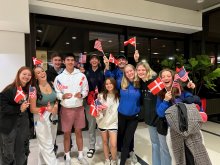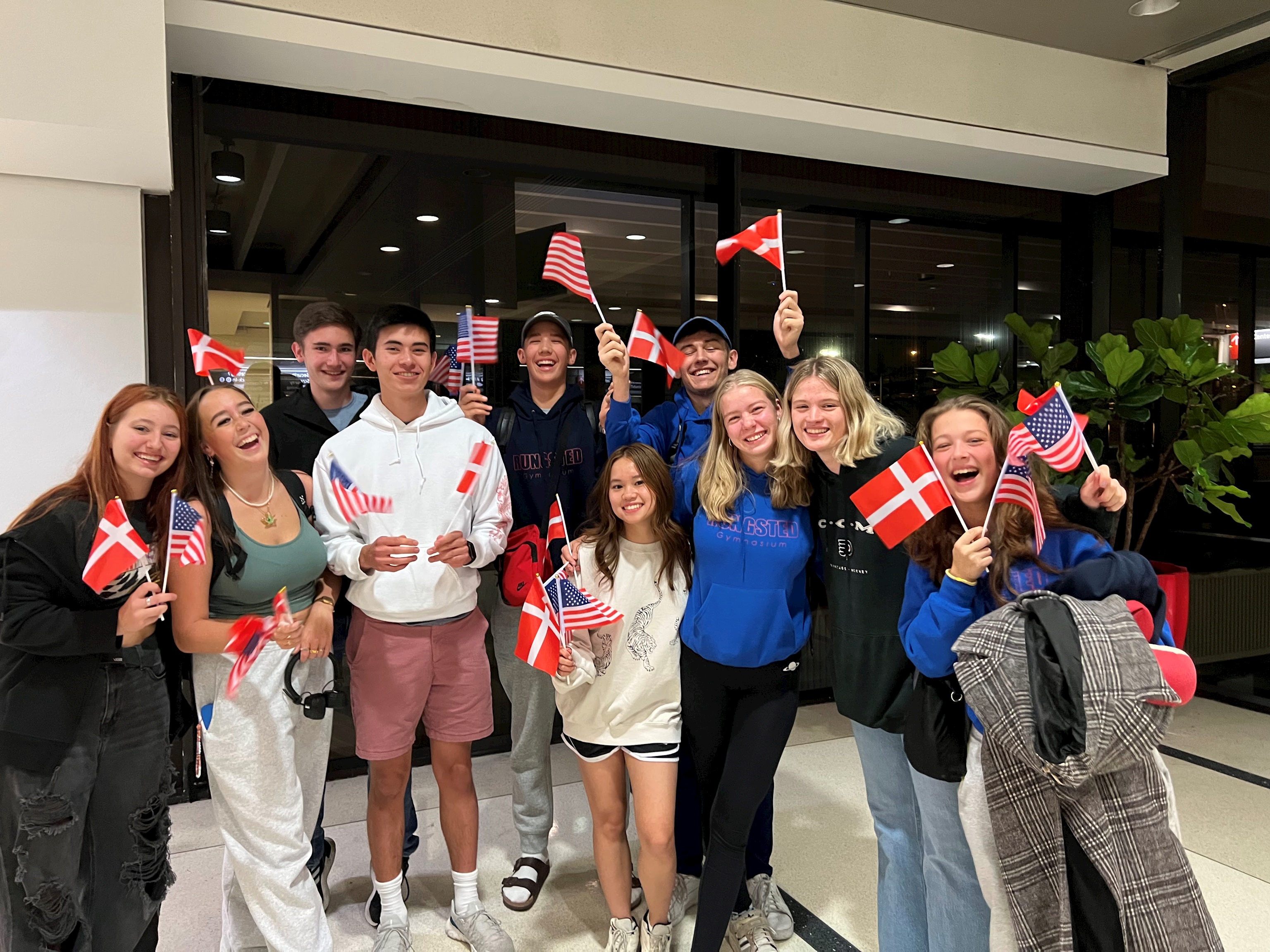
I have always had an intense interest in people and issues beyond our country. Therefore, I was excited when Tower Hill introduced a month-long foreign exchange program with Rungsted Gymnasium, a public high school of 900 students in an affluent area outside of Copenhagen, Denmark. After an application process, I was excited to be among five rising seniors chosen to participate in this incredible opportunity. Right on the heels of those feelings of excitement, however, I felt some apprehension; I had never visited Scandinavia before or lived abroad, nor did I speak one word of Danish.
Once I arrived in Denmark in August 2022, my concerns soon melted away. Living with the welcoming Hassel family, I learned that the positives far outweighed any uneasiness of being in an unfamiliar environment. Furthermore, English is widely spoken among Danes. I stayed on the island of Zealand where the capital Copenhagen is, and where about half of Denmark’s population is located. My Danish family lived off of Strandvejen, the scenic coastal road along the Øresund, the body of water that separates Denmark from Sweden. While the country is extremely flat, I was struck by the beauty of the buildings and the charm of the sea. Along Strandvejen, white houses with black Danish tiled roofs balanced a modern and traditional look, and every few miles there would be a harbor, beach and small town area. These were great meeting places to spend time with friends due to café trucks, restaurants and beach activities.
Almost immediately, the Hassels mentioned the word hygge. Carl, my host brother, defined it as an “atmosphere of wellbeing, warmth and good vibes.” This is a key cornerstone of Danish culture. Danes seem much more laid back than Americans, especially east coast Americans. Businessmen do not wear ties, and children call adults by their first names (including their teachers). The work-life balance appears much more favorable to the worker, and Danes do not solely focus on their careers. There is no Amazon in Denmark. Most Danes opt to shop at small, local businesses in person in order to preserve their “way of life.” They also lead a very active lifestyle with plenty of time outdoors. These reasons contribute to Denmark being one of the happiest countries in the world. Sometimes I thought I was in a sort of magical fairytale world due to the relaxed pace and happy faces.
“HYGGE: an atmosphere of wellbeing, warmth and good vibes. This is a key cornerstone of Danish culture.”
One of the things that made the greatest impression on me was Denmark’s commitment to combating climate change. While staying with my host family, I separated my waste into six separate bins according to food waste, residual waste, paper, plastic, glass and metal. Although this made cleaning up after dinner slightly lengthier, I was deeply impressed and inspired by the Danes’ commitment to protecting the environment. The once polluted waterways within Copenhagen have been thoroughly cleaned, and there are now sections designated exclusively for swimming. Denmark has large wind farms, and it also reduced carbon emissions from transportation. Within the city of Copenhagen, there are massive bike lanes, sometimes the same size as the road, and many people commute with bikes. This also helps to clean up traffic congestion within the city. I found public transport readily available and easy to use. Within a few days of my arrival, I was able to travel independently on buses and trains with the Rejseplanen app.
Another difference I noticed was the taste of food and drinks. Possibly due to more intensive EU regulations, food and drinks often tasted better. When I tried orange Fanta, I could actually taste a genuine orange flavor that seemed more natural and less processed. Fruits and vegetables tasted fresher. Fruit trees and plants were fairly common on residential properties, and I would be remiss to not mention elderflower. It was a refreshing treat to mix elderflower extract and water on a hot day.
I also learned about the perception of America outside of our country. The United States lies in a contradictory state in the Danish mindset. Some Danes remarked they were surprised that we five were not “fat and stupid.” Some of these stereotypes were fueled by social media clips of Americans failing to identify a single country on a map or people confusing the meaning of similar sounding words such as suffrage and suffering. Furthermore, the Danes were confused how a country with only two political parties could be so polarized and in such gridlock, which was in stark contrast to their multi-party parliament. Teenagers were extremely curious about and fearful of schools in America. They wondered how we were able to go to school with so many school shootings. However, they all remarked on how they wanted to visit America. Many Danish newspaper headlines were about America, and my host father, Jens, would discuss the politics and current events in the U.S. as easily as if he lived here.
My month in Denmark was a life-changing experience, and what was just as much fun, was seeing the U.S. through the eyes of my Danish brother, and the other four Danish students who arrived for the month of October 2022. Some differences they pointed out were America’s huge food portions, massive grocery stores and school sports teams. Of special interest was the prevalence of cars for transportation, especially among teenagers. Because of the cost of obtaining a driver’s license in Denmark (about $1,800 USD), many people do not get one when they turn 18. Another interesting fact about driving in Denmark is that right turns on red lights are prohibited. This difference caused Carl great anxiety when I did these turns legally in the U.S.
This exchange taught me the great value of pursuing and facilitating international exchanges and cross border communication. Denmark’s free health care and education but high taxes made me think about the merits and drawbacks of government spending, and whether Danish practices could be scaled up from a country of 6 million to one of 340 million. The experience has fueled deep thought and an expansion of my perspectives. Despite the many differences between our countries, ultimately we are all human. This summer, I returned to Denmark to visit my friends. I have a good feeling that my friendships and learning about Denmark will continue to grow throughout my life. For this and many other reasons, I am deeply thankful to Tower Hill.


























